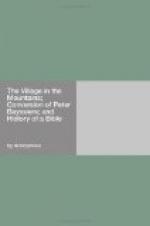The Lord, who never leaves himself without the witness of his numerous mercies to us, even when we are offending him in so many ways, was pleased to bless our marriage. Your birth, my dear children, crowned our joy, and left us nothing to wish but to see you grow and prosper, and to devote ourselves to your happiness. Alas! little did we suspect, whilst thus delightfully engaged, that this joy was to be so soon disturbed, and that death would deprive us of her who had given you birth. But our great God, whose ways and whose designs, though often inscrutable, are always full of wisdom, saw good to separate us; you from a tender and excellent mother, and me from a beloved companion and inestimable friend. She died February 11, 1821, after a few days’ illness, leaving me in a state of affliction which it would be in vain to attempt to describe.
Nevertheless, terrible as was the stroke, and heart-rending as was the separation, I can now acknowledge, my children, that it was a salutary chastisement, sent by sovereign love; and one of the links of that chain of Providence by which the Lord saw good to deliver me from the miserable state in which I was then living; and to lead me to the fountain of grace and true peace.
In fact, the death of your poor mother gave rise to a train of circumstances, which, by drawing my attention to subjects that I had hitherto totally disregarded, and by exciting in my mind a degree of energy of which I could not have supposed myself capable, ended by engaging me most unexpectedly in the serious study of religion. The particulars I am about to give you respecting these things, will convince you that God can overrule the wickedness of men for good, and will show you that a Romish priest was the means of directing me to the way, (I mean the perusal and free examination of the word of God,) which led me, eventually, to the Protestant church.
Your mother’s funeral was conducted with Catholic ceremonies, and, according to my means, I spared nothing to honour her remains. I likewise consented, either from conformity to custom, or from a wish to please my relatives, who were influenced by the fear of purgatory, or perhaps from participating myself in the false notion that bought prayers can mitigate the sufferings of the dead—from one or all of these causes, aggravated by the sorrow which filled my heart and inflamed my imagination, I consented to the performance of the nine customary masses for the rest of the soul.
The priest to whom I first went, told me that he was too busy to undertake the whole, but that I might depend upon him for three. From him I went to another, who engaged to say the remaining six, and did so without delay. Sunday after Sunday, for a considerable time, I went to the first, to inquire whether my three masses would be said in the following week. He always found some excuse, saying that “there were others more urgent than myself—that he was previously engaged—that he had undertaken




